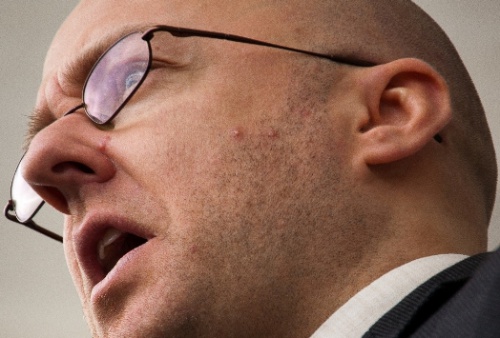'Equity in the Provision of Palliative Care in the UK: Review of Evidence' was compiled by Josie Dixon and colleagues at the London School of Economics'. They were tasked in particular with considering 'the economic implications of extending palliative care to those currently under-served', but as becomes clear in the 145-page report, its chief purpose is to disabuse anyone who believes they know what palliative care is or how well we do it. Figures like Prof Scott Murray have argued that palliative care must be at work in all illnesses, settings, times and dimensions of need; Dixon et al have made a concerted effort to ask how well the UK manages this.
They note that 'the UK, with its established hospice movement and statutory involvement in end-of-life care, ranks at the top of 40 countries measured in a 'quality of death' index developed by the Economist Intelligence Unit (2010)'. 'Many people do receive high quality end of life care' they say, citing reports of 'good', 'excellent' or 'outstanding' overall care during the last three months of life for 81 per cent of those who died at home, 84 per cent who died in a care home, 85 per cent who died in a hospice and 69 per cent who died in hospital. 'However, we know that care should be better for many people and that there remain significant gaps in provision across all settings.'
It is worth noting their use of the word 'equity'. As they state on page 17, inequality of provision can legitimately reflect the fact that 'different types of care and support are needed by different people at different times... this could lead to unequal provision, which is appropriately a mark of person-centred care'. Inequity, on the other hand, 'is inequality between different groups of people that is not justified by differences in need or preference'. 'A fundamental aspect of inequity identified in this review is overall under-provision of palliative care, with... an estimated 92,000 people a year in England, 6100... in Wales, 3000... in Northern Ireland and 10,600... in Scotland who would benefit from palliative care but are not currently receiving it.' In context, the 92,000 represent a quarter of the 355,000 people (75% of annual deaths) who 'have preceding palliative care needs'; almost half (171,000) receive specialist palliative care with the remaining 184,000 split between those in receipt of generalist palliative care and none at all.
The report considers evidence pointing to 'poor quality or poorly coordinated care. There are also specific examples of under-resourcing identified. There is under-provision, against national recommendations, of palliative care teams in a majority of hospitals.' As they note, against many measures Great Britain is a world leader in palliative care and it is clear that the principal concerns in what is mostly a great success story are: what can we do better and how can we do more?For Care Not Killing, the key themes of the report are the disparity in provision based on diagnosis; the paucity of research and comprehensive information; confusion in 'roles' and coordination in end of life care; and the issue of intelligent spending. On this last point, there is something for all those contesting the upcoming General Election to consider:
'... there is consistent evidence suggesting that extending access to palliative care is likely, on balance, to be cost-effective, reducing demand for acute and emergency care and delivering better outcomes for patients and their families.'
Diagnosis-based disparity
'Having a cancer diagnosis is the primary determinant of access to specialist palliative care. Across England, Wales and Northern Ireland, in 2012-13, 88 per cent of palliative care inpatients and 75 per cent of new referrals to hospital support and outpatient services were for people with a cancer diagnosis, even though cancer accounts for only around 29 per cent of deaths. We know from research studies that the situation in Scotland is similar.'
'Access to specialist palliative care for people with non-cancer diagnoses has improved... In 2013, across England, Wales and Northern Ireland, 20 per cent of new referrals to specialist services were for people with a non-cancer diagnosis, up from 12 per cent in 2008. But this still does not adequately reflect the proportions of people who die with non-cancer conditions. Twenty-eight per cent of people die with conditions of the circulatory system and 14 per cent with respiratory disease'.
People with non-cancer diagnoses receive less specialist care and less generalist care than people with cancer (although they receive more social care); studies indicate that cancer patients receive almost three times as many GP visits in the last three months of life and more than twice as much contact time with district nurses. 'Analyses of the National Survey of Bereaved People in England also show that people with cancer are more likely, compared to people with other conditions, to die at home rather than in hospital, even after controlling for age and whether the decedent has a spouse or partner.'
'There are many barriers to extending palliative care to people with non-cancer diagnoses. They include less predictable disease trajectories, greater difficulty in identifying a terminal stage, potential lack of clarity about appropriate palliative care goals, greater likelihood of comorbid conditions, insufficient resources, lack of condition-specific expertise, poor coordination between healthcare professionals and, in dementia, communication challenges and potential ethical and legal considerations.'
The 'review identifies the potential for clinicians to under-estimate pain and distress, particularly for older people, and especially those aged 80 or over, people with dementia and those receiving disease-modifying treatments.' It is hardly surprising then that 'older people with cancer, aged 60 or over, have also been found to receive less pain relief than younger cancer patients' and that 'across England, Wales and Northern Ireland, people aged 85 or over receive proportionately less specialist palliative care than other age groups; only 16 per cent of specialist palliative care is provided to people aged 85 or over, although 39 per cent of deaths occur in this age group.' All GPs know that most older patients approach them reluctantly, not wanting 'to be a bother', and most of us will know elderly people who share this reticence. Opening such communication more fully cannot be solved by national policy alone. This is one of many aspects of the report where it is clear that we must all individually invest in improving end of life care.
'Of neurodegenerative conditions, the most common requiring palliative care is dementia. It is not possible to identify the number of people who die as a result of dementia from death records, since many deaths are not directly attributed to dementia, but, rather, to the immediate cause of death... [but] as many as 30 per cent of people aged 65 or over die with dementia ... [and] the median length of survival from diagnosis to death is estimated to be around 4.5 years, although people can live much longer... The number of people with dementia is expected to more than double by 2050'.
The presence of comorbidities can be a key reason for patients being without access and dementia is far from being the only illness commonly associated with this: 'around 19 per cent of people dying of cardiovascular disease also have type II diabetes... The importance of comorbidities is that they increase clinical complexity and the likelihood of hospital death'.
Intelligent spending
'Currently, around 470,000 people die each year in England, 32,000 in Wales, 15,000 in Northern Ireland and 54,700 in Scotland. However, the need for palliative care is fast increasing as the population ages, particularly amongst those with non-cancer diagnoses, with the numbers of people aged 85 or over, for example, expected to more than double by 2037 in all four UK countries... Demographic changes mean that the number of deaths... [across] the UK is forecast to rise significantly over the next 20 years, along with the number of people with chronic illness and complex, multiple conditions... By 2037, total UK mortality is expected to rise to 675,000 deaths per year, from 548,000 deaths per year in 2015, an additional 127,000 deaths per year.'
Decision-makers should consider the ways in which shifting the focus to different forms of care and support can allow them to provide the service patients want and need, while reducing costs - a politician's dream. But such moves must be assessed on both the macro and micro level. Healthcare professionals do not want to waste precious time, let alone money, on a form of treatment which is wrong. Many, then, will be surprised to read that:
'Cost-effectiveness studies look at the combined costs and outcomes of a course of action, such as employing a palliative care intervention, and compare them with the costs and outcomes of an alternative course of action, generally 'usual care'. Consequently, an intervention can be cost-effective even if it is not cost-saving if the difference in costs is viewed as justifiable because of the difference in outcomes. Palliative care aims to improve quality of life and reduce distress. It is also commonly considered to have the potential to reduce acute care costs near end of life, by reducing unnecessary hospital admissions and acute interventions. Such savings may help to offset the costs of further investment in palliative care services'.
The estimated savings for extending provision of palliative care, especially outside of hospital, are substantial. 'Based on calculations in the Palliative Care Funding Review for England, extending "specialist and core" palliative care services to those that would benefit could result in net savings of':
- £36 million in England (based on costs for extending palliative care of £144 million and estimated savings of £180 million - 60,000 fewer hospital deaths)
- £2.4 million in Wales (£9.8 million, £12.2 million - just over 4,000 fewer hospital deaths)
- £1.2 million in Northern Ireland (£4.6 million, £5.8 million - nearly 2,000 fewer hospital deaths)
- £4.2 million in Scotland (£16.8 million, £21 million - nearly 7,000 fewer hospital deaths)
This being the case, there are solid budgetary, as well as clinical, reasons to confront the fact 'that only 21 per cent of hospitals offered face-to-face access to specialist palliative care seven days a week despite national recommendations that they do so, with the majority (73 per cent) offering such access just 5 days a week. Only two per cent of hospitals provided round the clock access.' Such figures encourage push-back against 'barriers to investment in palliative care [which] include competition for resources from other, better-established parts of the healthcare sector, challenges in expanding workforce and capacity, and the cross-sectoral nature of palliative care complicating both the delivery and the coordination of support for policy.'
The bottom line?
'There is some promising evidence that a palliative approach may be less costly, while at worst, it seems likely that it has the potential to improve outcomes for people with advanced illness or at end of life and their families for little or no more cost.'
Research paucity
'a lack of robust data...'
'no similar survey is undertaken in Wales, Northern Ireland or Scotland, leading to gaps in the evidence base for these...'
'no similar data, however, is available in Scotland...'
'a survey-based study... was conducted by Audit Scotland in 2008 but no similar study has been conducted since...'
'data on generalist palliative care provision is severely lacking... despite this being at the heart of evolving policy on end of life care...'
One of the report's most important themes was our chronically limited understanding of how palliative care works, and how it could work better. Again and again, the report notes that data sets available for one of the home nations is non-existent for others, with Scotland being a notable example of out-of-date or non-existent data. MSPs considering Patrick Harvie's widely drawn Assisted Suicide (Scotland) Bill: take note.
The effects of limited data are reflected in the fact 'that overall estimates of need necessarily rely on broad assumptions. In the Palliative Care Funding Review for England, Hughes-Hallett et al. (2011) estimate that 92,000 people are not receiving the palliative care from which they could benefit. However, the number could be higher or lower, with Hughes-Hallett proposing that it could be anywhere between 46,000 and 138,000 people.'
It is to Dixon et al's credit that where evidence is sparse, they state the need for better understanding of, for example, 'area-based differences', before policies are proposed.
'In summary, then, evidence on the costs and cost-effectiveness of palliative care is hindered by a lack of robust and relevant data on costs and resource use, diversity in the type of services evaluated and lack of consistent service definitions and terminology. There is a particular shortage of evidence in the UK.'
Role confusion
Possibly the most important lessons learned from the troubled Liverpool Care Pathway concerned the need for better education, training, co-ordination and supervision among healthcare professionals. The Dixon report reminds us that we still expect high-quality generalist palliative care despite the fact that 'the roles of different generalists in providing palliative care can be unclear to patients, their families and indeed to professionals themselves.'
Barriers to oft-called for training 'include time and resource pressures, unclear roles and responsibilities, attitudinal barriers, models for referral and forward care, the role of advance care planning, poor multi-disciplinary working and possible perverse organisational or professional incentives.''Factors impeding good quality generalist care, in hospital or in the community, include reluctance to take responsibility for end of life care, lack of confidence or skills, lack of suitable care models for people with non-cancer conditions, time pressures, difficulties incorporating care into a generalist workload and resource pressures. Care home residents often have complex needs, yet may not receive sufficient external palliative care or other specialist healthcare support, with evidence of poor coordination and confusion about the respective roles of care home staff and external providers.'
Our conclusion
We know that palliative care in this country, while excellent, is far from perfect. But this report highlights the potential high standards which we must continue to push for across the board - so that bills like Patrick Harvie's and Lord Falconer's are seen for what they are: surrenders, counsels of despair, calls for struggling doctors to give up upon patients.











